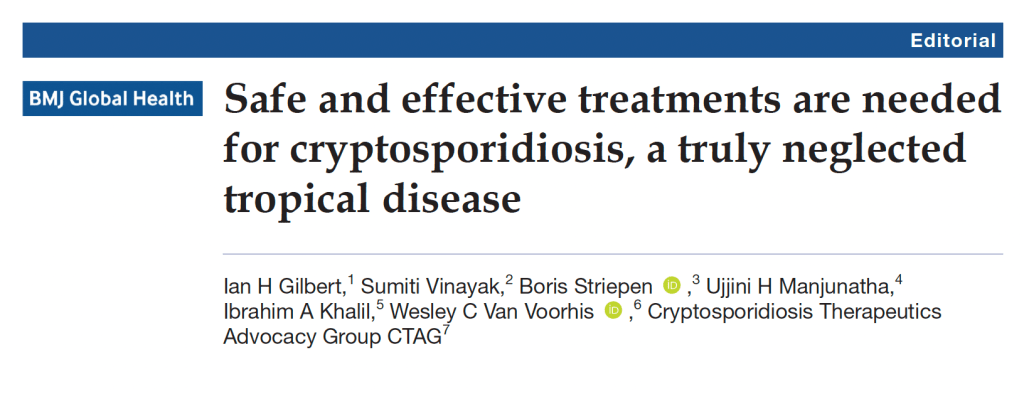What do we work on in the lab?
We study Cryptosporidium, a single-cell protozoan parasite that causes disease. Specifically Cryptosporidium causes diarrhea, which can be severe in immunocompromised adults (people undergoing organ transplant, chemotherapy, have advanced HIV/AIDS) but more commonly young children, especially ones who are malnourished. This diarrhea can be acute and severe, leading to death. In other kids it can be chronic and lead to life long health issues that are generally associated with malnutrition.
Our lab is studying how these parasites are transmitted- how do they spread from one person to the next. The form of the parasite that is spread through dirty water is called the oocyst. The oocyst is a microscopic egg shell that protects the Cryptosporidium parasites inside. It’s even strong enough to protect them from bleach! We are using genetics and biochemistry to understand how Cryptosporidium build this protective barrier.
We also collaborate with the Drug Discovery Unit and the Mode of Action team to use our insight into the biology to impact drug discovery. There is only a single medicine for cryptosporidiosis, and it is not effective in immunocompromised patients or young, malnourished children. Through our collaborations we hope to contribute to discovering new medicines for this important disease.
How many children are affected by cryptosporidiosis:
According to “Morbidity, mortality, and long-term consequences associated with diarrhoea from Cryptosporidium infection in children younger than 5 years: a meta-analysis study” published in Lancet Global Health, Volume 6, July 2018:
In 2016 cryptosporidiosis was estimated to cause:
- 48,000 deaths in children under the age of 5
- 44.8 million episodes of cryptosporidiosis (children may experience more than one infection/episode per year)
- 4.2 million disability adjusted life-years caused by acute cryptosporidiosis
- an additional 7.84 million disability adjusted life-years when accounting for the additional effects on growth faltering
Article can be found here: https://www.ncbi.nlm.nih.gov/pubmed/29903377
How is cryptosporidiosis treated?
Immunocompetent patients (includes children over 5 years old and adults with a health immune system) recover without treatment usually within two weeks. If symptoms persist, nitazoxanide is typically prescribed in the USA. Young children, malnourished children, the elderly, or the immunocompromised (those undergoing organ transplant, advanced HIV/AIDS, etc) may not be able to recover on their own and nitazoxanide has not been show to be effective for this population. In this event, correct diagnosis and care by a physician is critical.
There is a lack of new medicines to treat cryptosporidiosis. Many groups are working to improve this, but more work is needed to make these medicines a reality. Read about how important drug discovery for cryptosporidiosis is HERE:

How do I protect myself from exposure to Cryptosporidium?
- If contamination a water source is suspected, boil according to the advisory.
- Do not let your kids use swimming pools while they have diarrhoea. Wait at least 2 weeks until the symptoms are gone.
- Make sure children take frequent bathroom breaks when at the swimming pool.
- Do not ingest swimming pool water.
- Wash your hands after changing children’s diapers.
- Shower for 1 minute before you get in the pool
- https://www.cdc.gov/healthywater/pdf/swimming/resources/share-fun-not-germs-508c.pdf
Where can I learn more about Cryptosporidium?
The CDC website is a great source of information: